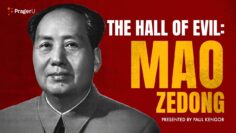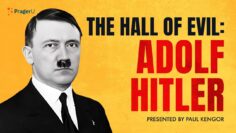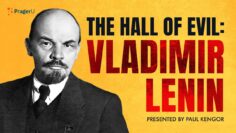
How Dark Were the Dark Ages? | 5 Minute Video
Were the Middle Ages, also known as the Dark Ages, characterized by oppression, ignorance, and backwardness in areas like human rights, science, health, and the arts? Or were they marked by progress and tolerance? Anthony Esolen, an English Literature professor at Providence College, explains.
🚨 PragerU is experiencing severe censorship on Big Tech platforms. Go to https://www.prageru.com/ to watch our videos free from censorship!
SUBSCRIBE 👉 https://www.prageru.com/join/
📲 Take PragerU videos with you everywhere you go. Download our free mobile app!
Download for Apple iOS ➡ https://itunes.apple.com/us/app/prage…
Download for Android ➡ https://play.google.com/store/apps/de…
📳 Join PragerU’s text list! https://optin.mobiniti.com/prageru
SHOP! 🛒 Love PragerU? Visit our store today! https://shop.prageru.com/
Script:
No period of history is more misunderstood or underappreciated than The Middle Ages, the ten centuries from the fall of the Roman Empire in the 5th century to the start of the Renaissance in the 15th.
This is especially true between the year 1000, when global warming brought grapes to England and grain to the coasts of Greenland, doubling the population and reviving town life all across the Europe, and 1348, after the warming had ended and the Black Death arrived from the east.
Let’s take a closer look at these years. We’ll make a good start by dispelling some nonsense.
The people of the Middle Ages did not believe the earth was flat. They knew it was round. The ancients said it was round, the Fathers of the Church said it was round; they saw its shadow during an eclipse of the moon, and the shadow was round; they saw masts of ships sinking below the horizon — round!
More nonsense: the Middle Ages were cheerless. Quite the reverse! They were full of color, of celebrations involving everybody in town; they invented the carnival; they revived popular drama, which had lain dormant for a thousand years; whatever they did, whether it was sinning or fighting or repenting or falling in love, or traveling thousands of miles to Rome or to the Church of the Holy Sepulcher they did it with energy and gusto.
What do we owe to the Middle Ages?
How about the university? Medieval man invented it. For the first time in the history of the world, you could go to Paris or Bologna or Padua or Oxford or Prague or Cologne and study under masters of law, medicine, philosophy, and theology, and your degree — designating you as a master or a doctor — would hold good anywhere in Europe. It was an international community of scholars. A young Thomas Aquinas, born in southern Italy at the beginning of the 13th century, would travel to Cologne to study philosophy under the philosopher-biologist Albert the Great, then to Paris where he taught theology and philosophy, then to Rome, and back to France — and this sort of thing was the rule among scholars, not the exception.
How about modern science? Thomas’s teacher Albert was a biologist. Why should that surprise us? Medieval man believed that God made the world as an ordered whole. They learned it both from Scripture and from pagan thinkers such as Aristotle. Science did not burst on the scene with Galileo. Copernicus died in the sixteenth century, but he was a priest-astronomer at a Polish university founded in the Middle Ages. He wasn’t even the first man to suggest that the earth orbited the sun. Others had ventured the suggestion. Most prominent was the late medieval Nicholas of Cusa — a philosopher and a cardinal in the Church.
How about architecture? If the Middle Ages were dark and ignorant, how come ordinary people — masons, carpenters, painters, sculptors, glazers — erected the most beautiful and majestic buildings to grace the earth, the Gothic cathedrals? Without power tools, with pulleys and winches and scaffolding and their bare hands, they built up lacework in stone and glass, flooding vast interior spaces with color and light; we have nothing to match their complexity and beauty.
For the complete script, visit https://www.prageru.com/videos/how-dark-were-dark-ages
source











The fact that there’s people that actually think that the Catholic Church wasn’t corrupt when the Vatican itself literally acknowledged that they did some evil stuff.
Let’s just ignore the >20% literacy rates, infrastructure decline, feudalism, witch burnings, inquisitions and religious persecution, short life expectancy, 20-50% infant mortality rate, constant war etc etc etc.
538 AD was literally a dark time. It was a year without a summer. But the name comes from the lack of literacy in a large portion of the society. But there were many that had the means and the education to continue making progress. Many of them were taught by monks how to read.
This is so indisputable, that even most contemporary historians have stopped using this term. It was popularized in the Renaissance period because they retroactively saw it as a time of political and economic decline.
I’ve visited a bunch of mideival cities and towns, jaw dropping looking at all those beautiful churches and buildings. Same thing with the roman architecture
Just nevermind about the constant warfare, famine, plague, life expectancy being a little over twenty, Roman infrastructure being obliterated or decaying, classical learning being lost… just forget all of that and pretend that there wasn’t a complete civilizational collapse in Europe at this time.
Your name's PragerU yet you put Prag in bavaria instead of Czechia
In many aspects, we are in dark ages today. Much darker than the middle ages.
This is my all time favorite PragerU video. I see it like an act of reparation and justice for the brilliance of the middle ages that has been unjustly dishonored. Thank you!
In many schools of history and related academia, Dark Ages is not a synonym for Middle Ages, but rather the specific period between the Fall of Rome and the dominance of the Roman Catholic Church (around the 11th Century – although in Britain the end of the Dark Ages is also measured by the arrival of the Normans in 1066). The name doesn't reflect the physical appearance or anything like that. It refers to the quality of information that survived that period. In fact, a dark age is not a specific period, but a term to refer to specific types of period. The ancient world also had dark ages, and when studying civilisations, dark ages are used to describe periods where the information is low quality (such as legends and folklore) or entirely lost (such as the fall of the Hittite Empire – although modern archeology allows us to understand more of that civilisation, the story of it's demise is almost entirely lost, except for a few excerpts from Greek, Egyptian, Babylonian and Israelite stories). So the Medieval Dark Age refers to the period where the information about those times are scarce. That's not to say no information exists – there were many monks who recorded the events of that time period. But rather, between the significant demographic shifts, the wars, the constant changes of language and culture, much of the timeframe was only rarely recorded, and many of those records have subsequently been lost. Hence, we rely heavily on late Middle Age (also known as the High Middle Ages, named for the dominance of the Roman Catholic Church – or the High Church) scholars, as well as the above mentioned stories and legendariums that were created from folklore and legend. And that is why there is a term used academically and historically for the Dark Ages – it is a time more shrouded in mystery and legend than verifiable fact. The High Middle Ages are an entirely different story, which is why they are NOT included in the term Dark Ages (although the term was also used to describe moral darkness – referring to the pre-Reformation era, and relates to similar imagery about light and darkness, such as the term "the Morning Star" to refer to Erasmus and his work, but that is about moral philosophy and theology, not about history).
Goofy video, anybody who knows about history would know that the Middle Ages were terrible. Serfdom, Starvation, child mortality, hmm, why was that not mentioned? Also this talks about a very specific part of the Middle Ages (1300s and 1400s), leaving out the earlier times, which were the actual dark ages.
Interesting how this video ignores the fact that medieval intellectual accomplishments were built on the translation of books from Arabic. These included all of Aristotle, translated into Arabic in the 8th and 9th century, then translated into Latin in the 12th and 13th centuries. Scholars such as Albertus Magnus and Thomas Aquinas relied on the Muslim scholar Avicenna to understand Aristotle. Nasir al-Din al-Tusi influenced Copernicus as well.
Global Warming is cyclic over hundreds of years, humans do not cause it
About as DARK as TODAY…!!!
I like this channel, but come on, the first 300 – 500 years after Rome got sacked, was pretty bad. Agreed that After political restablization, the High Middle Ages, tbis were pretty good in Western Europe if you weren't a serf.
https://youtu.be/xQUeA9y2xH8
I don't owe anything to the middle ages. I owe everything to God and my lord jesus.
We’re in the dark ages now 1945-present. The Middle Ages weren’t dark.
Another thing the Magna Carta one of the first documents protecting human rights
And there was one church before Luther and Henry VIII that inspired this brilliant civilisation, it was the Catholic Church, and not being true to this historical fact, it is not even mentioned. It was the splintering of the Christian Catholic faith that then gave rise to such needless bloodshed and loss of faith to give birth to the godless society of today that wracked Europe with the falsely named period, the Enlightenment. It was the darkened minds without Christ that still kill off all aspects of faith in the unseen Godhead, and those once glorious cathedrals giving praise to God at the Holy Sacrifice of the Mass. The reformers goal was to destroy this connection to God and thoroughly they did it, outlawing the Catholic church for nearly 300 years in England. But God is not thwarted by man, for in 1531 Our Blessed Mother appeared to Juan Diego and South America became Catholic. In 1858, despite the 'god of reason' desecrating the Cathedral of Notre Dame in Paris, Our Blessed Mother appeared to Bernadette Soubirous in Lourdes, where countless miracles have occurred, for those that don't have faith no explanation is possible, for those that do have faith, no explanation is necessary. In 1917, in Fatima Portugal while WWI raged, Our Blessed Mother appeared to 3 shepherd children to ask them to pray the Rosary and make sacrifices for poor sinners, and amidst 70,000 believers came the scoffing communist leaders of Portugal to witness on October 13th the miracle of the sun dancing in the sky. God is alive in His church, as Saint Joan of Arc confirmed, Christ and His Church are but one thing, an attack on the Catholic church is an attack on Christ, but woe to those church leaders who lead others by their bad example to lose their faith.
INQUISITION … THE CHIDREN CRUSADE .. ITS COOL
He talks about the Medieval Age, but Dark Ages comes before it.
Collectively the Middle Ages were 476 – 1500 AD. We call this period the Middle Ages because it came between the original Roman Empire and the beginning of the Modern Age. The word medieval is just latin for "middle age". The Middle Ages are split into three sections: 1) The Dark Ages or Early Middle Ages (476-1000 AD) is a section of the Middle Ages that some use to describe the economic, intellectual, and cultural decline of Western Europe. 2) The High Middle Ages (1000-1300 AD) include the rapidly increasing population of Europe, which brought about great social and political change from the preceding era, and the Renaissance of the 12th century, including the first developments of rural exodus and urbanization. This was a period were art, architecture, and science flourished. 3) The Late Middle Ages (1300-1500 AD) Around 1300, centuries of prosperity and growth in Europe came to a halt. A series of famines and plagues, including the Great Famine of 1315–1317 and the Black Death, reduced the population to around half of what it had been before the calamities. Along with depopulation came social unrest and endemic warfare. France and England experienced serious peasant uprisings. To add to the many problems of the period, the unity of the Catholic Church was temporarily shattered.
All true, but you also have to consider the other side of the coin. The dark and middle ages were also periods of feudalism; of intense, insurmountable and perpetual poverty; mass murders; commonplace atrocities; endless wars and fighting; vicious anti-semitism; and suppression of knowledge.
There was no childhood. Children had to work from dawn to dusk from the earliest ages in some way to help their parents put enough food on the table. When someone fell ill, there was little hope of recovery. Childbirth was extremely deadly. There was little to no support system for the unfortunate. Life had no value. Big projects like those undertaken under the Roman Empire were nonexistent; And so on and on.
The knowledge and universities he speaks of were only available to the elite. The masses, the overwhelming majority of people, had short lives in which they were too poor to leave their village, survived on subsistence living, and constantly faced disease, death of loved-ones, and suffering from those who had or sought power. They knew little more than what they were taught growing up, and were illiterate. And there was absolutely nothing they could do (or allowed to do) to change their circumstances. The common man was simply viewed as helpless, ignorant subjects.
So while the period may have been an improvement over previous eras (besides, possibly, the Roman era), it is still a very dark period when compared to the modern age.
I thought it was the dark ages because human civilization was facing a lot of adversity and hardship in those times.
The plague has trouble finding victims
let's be frank. most notions of the Middle Ages come from movies, where everyone has sooth on their face and wears frumpy clothes.
but they didn't have Uber Eats, so it was a shithole.
Interesting video that describes the dark/middle ages quite well. The dark ages were called dark because the main civilization fell (Rome) and because in 536 there was basically no sunlight for 18 months. So dark is both a metaphor for instability and literal.
And this entire discourse ignores the role of the Eastern Roman Empire, aka the "Byzantines", which was as Christian as the West, if not more so, and stood as a bulwark, at first against the Persians, and later against the Muslims.
LOVE TERRORISM.
LOVE GOD. LOVE MURDER.
It was the “Dark Ages,” because the lack of freedom of religion.
What did they teach in medieval college's
It is curious that while other religions stifled art, science, and philosophy (namely the 1 fabricated by a 6th century bandit),
under Christianity, these areas flourished.
I've read that a volcanic eruption in 536 caused a great deal of materials in the atmosphere to block sunlight for 180 years. I attributed the label to that.